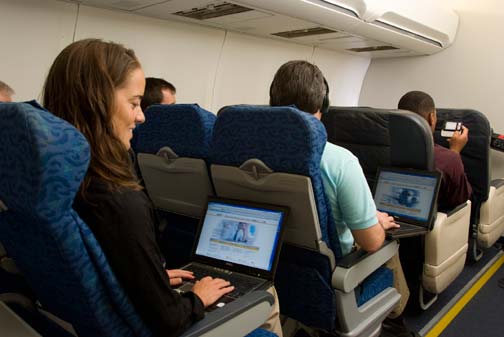The WiFi Skies: Airlines Embrace Broadband

Passengers on airliners and business jets may differ in terms of what they pay for their flights, but thanks to the development of airborne broadband technology, they can now access the Internet, e-mail and text message while enroute regardless of whether they fly commercially or privately.
In August, American Airlines became the first U.S. air carrier to offer inflight broadband service. Passengers on the airline's Boeing 767-200 aircraft can access coast-to-coast coverage on nonstop flights between New York and San Francisco, New York and Los Angeles, and New York and Miami.
"We are pleased to provide our customers with the unprecedented ability to stay connected to their family, friends and business associates on the ground via the Internet while traveling at 30,000 feet above the United States," said Dan Garton, American's executive vice president – marketing.
Gogo takes off
The service offered by American Airlines is based on technology developed by Itasca, IL-based Aircell LLC, which calls its airline WiFi broadband service "Gogo Inflight Internet." Delta Airlines, Aircell's second commercial air carrier client, will offer Gogo in first and economy classes on hundreds of Delta aircraft next year.
"Delta remains committed to providing a travel experience that maximizes the time our customers spend with us onboard by offering them even more productivity options," said Richard Anderson, Delta's Chief Executive Officer. "Our customers asked for in-flight connectivity, and we're responding by rolling out the most extensive Wi-Fi network in the sky."
In addition to airborne Internet access and WiFi-enabled communications, Aircell/Gogo equipment on jetliners allows air carriers to store and offer hundreds of movies, video games and music files to passengers. Greater inflight entertainment holds the promise of increasing airline revenues at a time when profitability could again be threatened by rising fuel prices.
Sign up for the Live Science daily newsletter now
Get the world’s most fascinating discoveries delivered straight to your inbox.
The first international Gogo customer is Air Canada, Canada's largest airline. Aircell has a contract to install broadband technology on Air Canada's Airbus A319 jetliners used for flights to the United States. The Air Canada Gogo service is expected to start in spring 2009.
On all air carriers, Gogo is available to passengers as a fee-based service. American Airlines, for example, is charging $12.95 for Gogo Inflight Internet on flights longer than three hours. Travellers can access Gogo when the aircraft is above 10,000 feet and from any seat.
Devices that communicate with the Gogo system include laptop computers with 802.11 a/b/g WiFi capability, smartphones and other Wi-Fi handheld devices such as BlackBerry, Windows Mobile, Apple, and Nokia Symbian S60. Gogo does not support voice service.
Coast-to-coast Gogo service is possible due to Aircell's national network of 92 transmitter sites. The company plans to enlarge the network to 500 sites and is looking at expanding into Canada, Mexico and the Caribbean.
Alaska Airlines is also offering WiFi broadband to its customers, but has opted to use a satellite-based system from Row 44, an airborne broadband company headquartered in Westlake Village, CA. The Row 44 system works over land and water and across international borders, allowing passengers to use the Internet, e-mail and use text messaging regardless of aircraft routing.
Business jet users stay connected too
Like airline passengers, people who fly on corporate jets also want to stay connected to the outside world. To satisfy their requirement, corporate jet manufacturers offer airborne WiFi broadband technology as an equipment option.
Customers of Cessna, Gulfstream, Learjet, Hawker, Bombardier, Dassault Falcon, and Embraer have ordered the Aircell Axxess system for their business aircraft. Axxess is comprised of communications hardware and software with a WiFi broadband service add-on.
System installation occurs during aircraft manufacture, or for older airplanes, when temporarily taken out of service for maintenance, typically.
Because many corporate aircraft operators travel beyond the range of transmitters in the lower 48 states, satellite-based WiFi broadband has become increasingly popular with business jet users since 2005.
Aircell's SwiftBroadband service provides global Internet and wireless communications coverage using the Inmarsat constellation of 12 telecommunications satellites in geosynchronous orbit.
SwiftBroadband's voice and data transfer speed is up to 432 kilobytes per second (kbps). High-speed Internet at home and the office is a minimum of 256 kbps.
Another feature of airborne WiFi broadband that appeals to users of business aircraft is VPN – Virtual Private Network. VPN allows for secure communications; e-mails and file attachments are encrypted before transmission.










